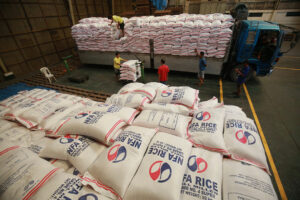By Kyle Aristophere T. Atienza, Reporter
THE further decline in the farmgate price of palay (unmilled rice) was largely caused by competition from cheap imports and the government’s subsidized P20 rice program, a farmer’s group said.
“This confirms what many farmers from various parts of the country have been complaining about,” Federation of Free Farmers Cooperatives, Inc. National Manager Raul Q. Montemayor said via Viber.
“Normally, palay prices go up after the harvest and into the May-June planting season,” he said, “but this time, prices have been going down,” he added.
He noted that rice imports that are already in the country are cheap, with 5% broken-grain rice averaging P29.50 per kilo in June — compared to P40.67 per kilo in June 2024 — ex-pier and with tariffs already paid.
Ex-pier costs include the purchase cost from source country on a free-on-board (FOB) basis, plus freight, insurance, and tariffs.
Meanwhile, the landed price of imported rice with 25% broken averaged P26.34 per kilo in June, against P41.09 a year earlier.
He also said the P20-per-kilo rice program has led traders to hedge and buy palay from farmers at low prices “in case they have to compete with this cheap rice.”
The Department of Agriculture (DA) is pushing Congress to pass a bill seeking stricter oversight of rice imports and restoration of the National Food Authority’s (NFA) regulatory powers.
The farmgate price of palay fell 31.8% year on year in June to an average of P16.99 per kilo. Month on month, the average palay farmgate price fell 4.3% compared to May.
Agriculture Secretary Francisco Tiu Laurel, Jr. in a separate statement said the claim that the P20-per-kilo rice program is behind the declining palay prices is “simply not true,” noting that it has helped the NFA decongest its warehouses and has allowed the government “to buy more palay from farmers.”
“On the contrary, we need to accelerate the expansion of the subsidized rice program,” he said.
“Every bag of rice sold at P20 frees up space for two sacks of palay, which we can purchase at better prices than what private traders offer,” he added.
Mr. Montemayor said NFA’s buying has been minimal “due to congestion of its warehouses and strict standards (clean and dry) when buying palay from farmers.”
“Even without these constraints, its funds can absorb only 5% at most of the harvest volume,” he added.
“The government has passed the blame to palay traders and has asked farmers to report to them traders who are ‘nambabarat,’ (forcing them to accept low prices),” he said.
“But it is very possible that the drop in palay prices is to a large extend due to its own rice subsidy programs, its unlimited import policy, and its failure to support palay prices through the NFA,” he added.
Currently, the NFA buys palay at a minimum of P17 per kilo for fresh grade and up to P24 per kilo for dry.
“To support this effort, the agency is acquiring more trucks, upgrading its warehouses, and requesting a larger procurement budget,” Mr. Laurel said.
As of June 30, the NFA procured 149% of its first half target, approaching capacity “in response to the clamor from farmers for the agency to buy more palay,” he added.
The DA urged Congress to pass the proposed Rice Act before the first harvest of 2026. It is currently conducting “on-the-ground consultations” with farmers and lawmakers in preparation for congressional deliberations.
It said it is backing a provision that would give the NFA “some control” over rice imports.
It’s “critical gap that leaves the DA with limited ability to manage domestic supply,” Mr. Laurel said. The Rice Tariffication Law of 2019 allowed unlimited rice importation by the private sector, though requiring them to pay import tariffs, and removed the NFA’s own power to import rice and sell rice directly to consumers.
The law was amended last year to increase the allocation for the Rice Competitiveness Enhancement Fund to P30 billion from P10 billion, paid out of rice tariff collections.
Mr. Laurel said the consultations will “help shape the government’s response to the recent decline palay prices, which threatens to discourage future planting.”

